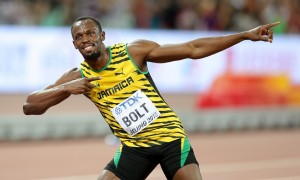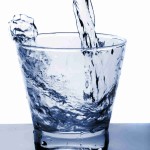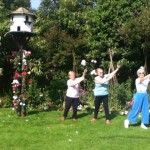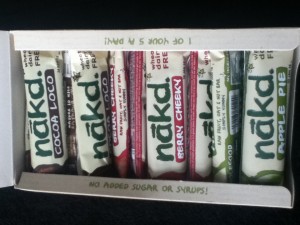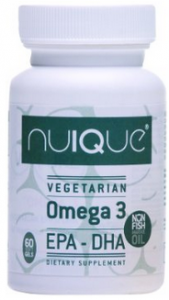What is Atrial Fibrillation?
Atrial Fibrillation (AF) is the most common type of arrhythmia. It is an electrical disruption of the rhythm of the heart, causing an irregular and often rapid heart rhythm.
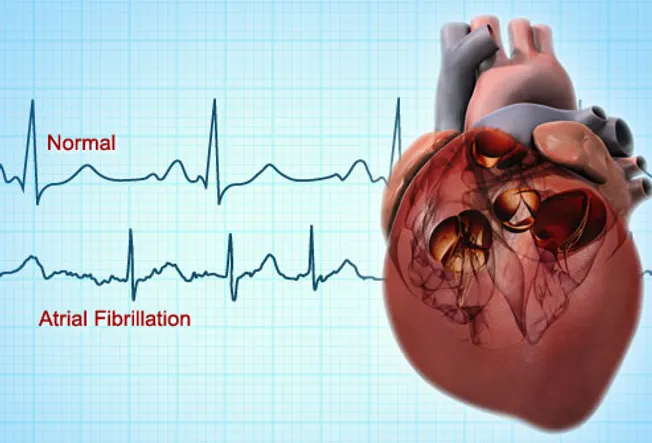
Normal sinus rhythm (top) and atrial fibrillation (bottom) characterised by the absence of p wave (atrial depolarisation)
AF usually causes the heart’s lower chambers, the ventricles, to contract faster than normal. When this happens, the ventricles can’t completely fill with blood. Thus, they may not be able to pump enough blood to the lungs and body. While some people are asymptomatic (and the problem is only discovered during a physical examination), AF can lead to signs and symptoms, such as [2]:
* Palpitations (feelings that your heart is skipping a beat, fluttering/beating too hard/fast)
* Shortness of breath
* Weakness or problems exercising
* Chest pain
* Dizziness or fainting
* Fatigue (tiredness)
* Confusion
Complications
AF has two major complications—stroke and heart failure.
a) Stroke
During AF, the heart’s upper chambers, the atria, don’t pump all of their blood to the ventricles. Some blood pools in the atria. When this happens, a blood clot (also called a thrombus) can form. If the clot breaks off and travels to the brain, it can cause a stroke. (if it travels to another part of the body, e.g. lung, it is called an embolus).
Blood-thinning medicines to reduce the risk of stroke are thus often given to people suffering from AF.
b) Heart Failure
Heart failure occurs if the heart can’t pump enough blood to meet the body’s needs. AF can lead to heart failure because the ventricles are beating very fast and can’t completely fill with blood. Thus, they may not be able to pump enough blood to the lungs and body.
Fatigue and shortness of breath are common symptoms of heart failure. A buildup of fluid in the lungs causes these symptoms. Fluid also can build up in the feet, ankles, and legs, causing weight gain.
Lifestyle changes, medicines, and procedures or surgery (rarely, a mechanical heart pump or heart transplant) are the main treatments for heart failure.
Prevalence – How common is it?
AF is occurring in epidemic proportions [1]. Medicine says there is no cure and only offers drugs and surgery for the symptoms [1]. But is that so? What is really the cause of this condition?
Medication – calcium channel blockers
It is interesting that (among others) calcium channel blockers (CCB) are often prescribed for AF to help slow the heart rate.

Calcium Channel Blockers (CCB) – Mechanism of Action [3]
CCB slow the heart rate by blocking the number of electrical impulses that pass through the AV node into the lower heart chambers (i.e. ventricles, the chambers that contract to propel the blood forward). Therefore, CCB do NOT deal with the heart beat irregularity, they just prevent the heart from beating at a dangerously fast rate, thus likely reducing symptoms.

Calcium Channel Blockers – Effects & Side-Effects
Like most medications, CCB also have possible and considerable side effects [4] (above) which should be taken into account, though serious side effects are claimed to be rare [5]
Calcium and Magnesium “interplay”
We also know that, physiologically, calcium and magnesium complement each other (synergists) and also oppose each other (“agonists”). In what way? Well, the body requires a precise ratio of calcium and magnesium to work correctly and:
a) many supplement calcium to prevent osteoporosis, for instance, but do not supplement magnesium (also needed for good bones and teeth). At the same time,
b) many are low in magnesium. While some sources say this is not the case, they add that “Certain medical conditions … can upset the body’s magnesium balance. For example, an intestinal virus that causes vomiting or diarrhea can cause temporary magnesium deficiencies. Some gastrointestinal diseases (such as irritable bowel syndrome or IBS and ulcerative colitis), diabetes, pancreatitis, hyperthyroidism (high thyroid hormone levels), kidney disease, and taking diuretics can lead to deficiencies. Too much coffee, soda, salt, or alcohol, as well as heavy menstrual periods, excessive sweating, and prolonged stress can also lower magnesium levels.”. How many are really NOT on that list?
c) Magnesium and calcium work together at very precise ratios to ensure your heart functions properly. [6]
Physiologically, calcium is the main mineral needed for muscle contraction (including the contraction of the muscular linings of blood vessels throughout your body, such as the arteries that supply the heart with oxygen)[5] , while its “opposite”, magnesium, is the most important mineral for muscle relaxation. So I sometimes thought… could it be a mineral imbalance, would supplementing with magnesium help?
And it seems that Dr Carolyn Dean had the same thought and researched this in detail (more below) but she is not the only one…
Research on Magnesium Supplementation
Symptoms of magnesium deficiency may include agitation and anxiety, restless leg syndrome (RLS), sleep disorders, irritability, nausea and vomiting, abnormal heart rhythms, low blood pressure, confusion, muscle spasm and weakness, hyperventilation, insomnia, poor nail growth, and even seizures… Low levels of magnesium may increase risk of developing asthma. [6]
Getting enough magnesium may enhance the effectiveness of conventional treatment for the following conditions: asthma, depression, diabetes, fibromyalgia, noise-related hearing loss, arrhythmia and heart failure… and reduces risk of colorectal cancer, helps relieve symptoms of PMS, may be used to manage pre-term labour and, in its IV form, is the treatment of choice for pre-eclampsia [6]
Hypertension. A large clinical study of more than 8,500 women found that a higher intake of dietary magnesium may decrease the risk of high blood pressure in women. A few studies also suggest that magnesium supplements may help lower blood pressure, although not all studies agree. [6]
Headaches. A few studies suggest that taking magnesium supplements may help prevent migraine headaches. In addition, research suggests that magnesium supplements may shorten the duration of a migraine and reduce the amount of medication needed. People who have migraine headaches tend to have lower levels of magnesium compared to those with tension headaches or no headaches at all.
Magnesium and Heart Health. Magnesium is essential to heart health… Magnesium helps maintain a normal heart rhythm and is sometimes given intravenously (IV) in the hospital to reduce the chance of atrial fibrillation and cardiac arrhythmia (irregular heartbeat). People with congestive heart failure (CHF) are often at risk for developing cardiac arrhythmia. For this reason, your doctor may decide that magnesium should be a part of the treatment of CHF. One-well designed study found that taking magnesium orotate for a year reduced symptoms and improved survival rates compared to placebo in people with CHF… If you have a cardiac history, talk to your doctor before taking magnesium supplements. [6]
How to Take Magnesium (general info)
If under supervision, ask your doctor. There are many forms of magnesium to be taken by mouth, some are more easily absorbed than others, some have a laxative effects, others don’t. Epsom salts are instead absorbed via the skin, helping ease muscle aches and pain, relieve swelling and inflammation.
It is a good idea to take a B vitamin complex, or a multivitamin containing B vitamins, [my comment: in general a good idea anyway!] because the level of vitamin B6 in the body determines how much magnesium will be absorbed into the cells. [6]
Dr Carolyn Dean’s solution
Dr Carolyn Dean also suffered from heart palpitations, which led her to search for an effective treatment for AF many years. The treatment that she zeroed in on is based on taking the right kind of magnesium (a non-laxative one which is well absorbed) plus proper hydration and sea salt or Himalayan salt.
Dr Dean really believes that giving your heart the necessary minerals overcomes the electrical disruption and balances your heart rhythm.
Her ebook “Atrial Fibrillation: Remineralize Your Heart” walks you through the possible triggers for this condition and uncovers their basis in magnesium deficiency. Numerous case histories help you realize that you don’t necessarily have a heart condition, you have a magnesium deficiency condition that can be treated.
Thanks to Dr Dean you can be in charge of your body and be in control of your health again.
This book outlines a treatment protocol that Dr Dean created for her own heart palpitations and that uses her 4 Complement Formulas that can meet most of an individual’s nutrient and therapeutic requirements. http://sn.im/afib
People with severe magnesium deficiency, who were forced to take several IV magnesium treatments per week because they developed diarrhea from oral magnesium, have switched to her own type of magnesium only to find that their magnesium blood levels increase and their overall health improves.
Dr Dean received “The Arrhythmia Alliance Outstanding Medical Contribution to Cardiac Rhythm Management Services Award 2012” at The Heart Rhythm Congress organized by the Heart Rhythm Society (HRS), Sept 23-26, 2012.
Dr Dean was not satisfied with the award though: she wanted to write this book to show people that they can get better, that AF can be eliminated. And in those cases where the structural damage to the heart is too extensive and her protocol is not enough, they can have their ablation and cardioversion procedures (i.e. surgery) as long as they keep taking their magnesium.
What magnesium to take?
She recommends her own ReMag product, but this is not available in the UK at the time of writing. As an alternative, a similarly-ionic and liquid magnesium I like is this one:
Ionic Liquid Magnesium

I like to put a few drops in my glass or bottle of water and drink throughout the day. As a bonus, it makes plain water tastes much better!
CAPSULES – Magnesium for cardiovascular health
Alternatively, a very good form of magnesium to prevent arrhythmias and for people with cardiovascular health challenges is magnesium taurate.
This form of magnesium:
- is easily absorbed (magnesium and taurine stabilise cell membranes together), and
- it contains no laxative properties
- is great for cardiovascular health and to prevent arrhythmias
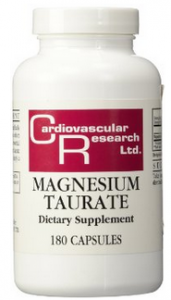
http://goo.gl/FnSuq1
Summary: Why Take Magnesium?
To help ease agitation and anxiety, restless leg syndrome (RLS), sleep disorders, irritability, nausea, vomiting, abnormal heart rhythms, low blood pressure, confusion, muscle spasm and weakness, hyperventilation, insomnia, poor nail growth, and even seizures, asthma, fibromyalgia, noise-related hearing loss, PMS symptoms, (doctor given for ) pre-eclampsia, balance calcium intake for strong bones, teeth (and heart), arrhythmia and heart failure. (check with your doctor if you have these conditions or are on medication for them).
Different forms may be more suitable for different conditions. This article is coming up… and will be linked to from here!
To your health!
Emanuela.
Sources:
1) http://sn.im/afib
2) http://www.nhlbi.nih.gov/health/health-topics/topics/af
3) http://medmovie.com/library_id/3255/topic/ahaw_0247i/
4) http://rightatrium.tumblr.com
5) https://www.bhf.org.uk/heart-matters-magazine/medical/drug-cabinet/calcium-channel-blockers
6) http://umm.edu/health/medical/altmed/supplement/magnesium
Tags: magnesium, atrial fibrillation, heart failure, stroke, calcium channel blockers





